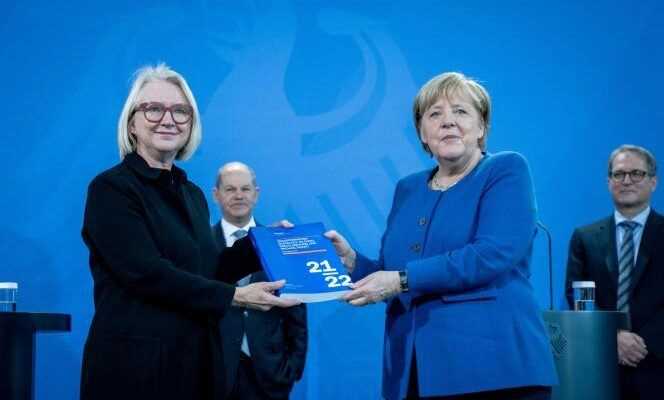It is the small changes which, in Germany – a country deeply attached to stability -, provide information on the major ruptures. Wednesday November 10, the council of wise men, the committee of economists advice of the government, delivered one of these signs which do not deceive. For the first time, their annual report reflected, in a balanced way, two different approaches to influencing the fiscal policy of the next cabinet.
One defends the strict discipline of public accounts, in the so-called “ordoliberal” ultrarhenan tradition. The other suggests original solutions to finance the huge investments in digital technology and decarbonization that the future coalition wishes to achieve. “It will not work only with conventional methods”, believes Monika Schnitzer, one of the economists on the board, advocates the second approach.
Never before have the conclusions of this annual report traditionally dominated by orthodox economists been so open. This revolution in the council of elders exploits an unexpected opportunity. In 2020, Angela Merkel’s coalition government failed to agree on the reappointment of the chairman of the board, the very conservative Lars Feld. The latter therefore left the body, without a successor. Instead of five members, the board has only four, which has made it necessary to respect the balance of approaches. It is also a reflection of the profound renewal of the debate on macroeconomic issues in the country.
The coalition in formation – made up of the Social Democrats, the Greens (progressive on the budgetary plan) and the liberals of the FDP (more orthodox) – is also exposed to this controversy. For the future government, the dilemma is the following: how to free up sufficient budgetary room for maneuver, while avoiding increasing taxes and touching the constitutional mechanism of the “debt brake”, which limits to 0.35% of gross domestic product the authorized structural deficit? A challenge, while the state coffers have already financed the effort to support the economy due to the health crisis. Around the parties of the future coalition, economists compete for suggestions in order to allow the state to borrow more … without this appearing in the budget.
Build a cash reserve to spend later
A very debated first strategy would consist in using public companies, which benefit from the same advantageous interest rate as Germany, to borrow heavily. Deutsche Bahn, a railway company wholly owned by the Federal State, could thus obtain the precious liquidity to push the decarbonization of transport and improve infrastructure. The KfW investment bank, also owned by the State, is also a coveted instrument. It could evolve into a public investment fund in order to finance the energy transition. However, in the eyes of the Orthodox, these instruments have the drawback of potentially escaping the control of parliamentarians, unlike a classic finance law.
You have 38.09% of this article left to read. The rest is for subscribers only.
